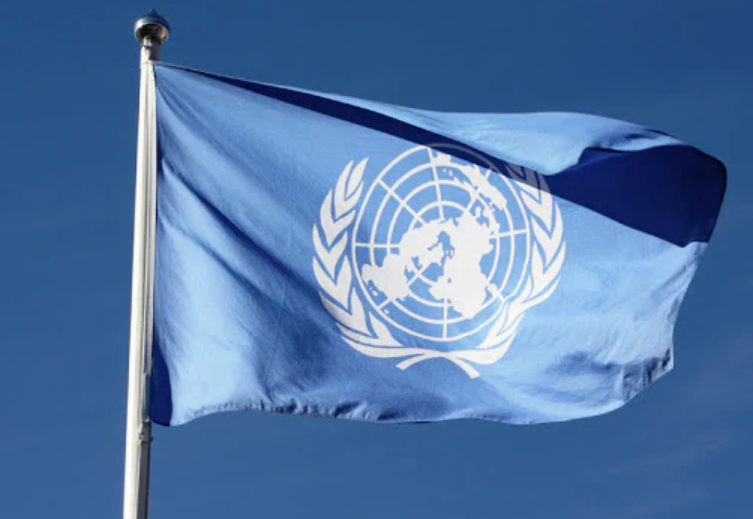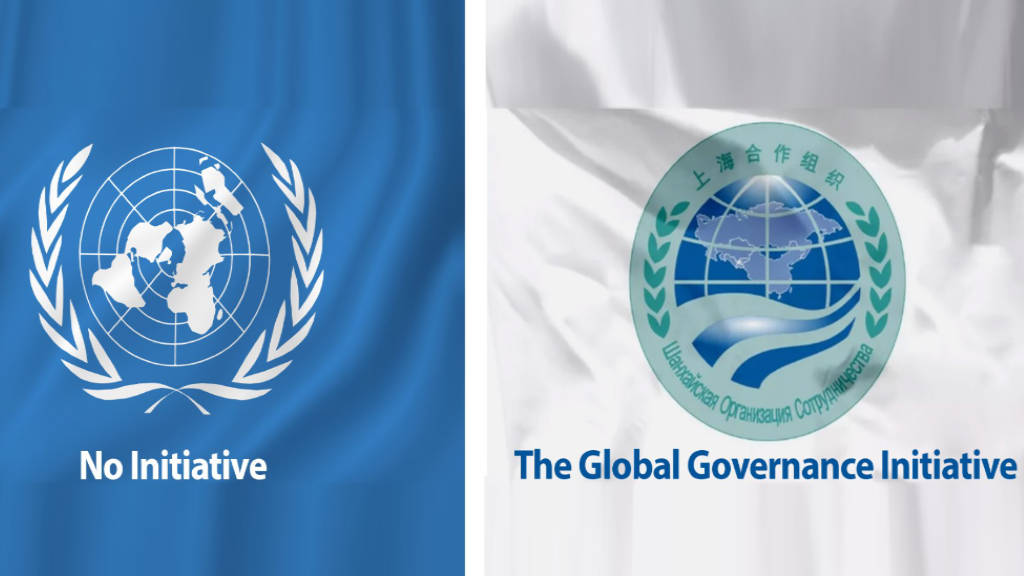During the 2025 SCO Heads of State summit in Tianjin, the hosting Chinese President, Xi Jinping, introduced a concept called the “Global Governance Initiative” (GGI) which lays out a platform for the development of a ‘new world order’. Xi stated that “Global governance has reached a new crossroads. We must continue to take a clear stand against hegemonism and power politics, and practise true multilateralism. I look forward to working with all countries for a more just and equitable global governance system and advancing toward a community with a shared future for humanity.”
This was immediately endorsed by the SCO members, including Russian President Putin, who stated that it “would revive genuine multilateralism as it lays out the political and socioeconomic groundwork for the formation of a new system of stability and security in Eurasia”.
But what is the ‘Global Governance Initiative”? In this complete text, our analytical comments are prefixed RPA. President Xi introduced it as follows:
Background

“2025 marks the 80th anniversary of the founding of the United Nations. Eighty years ago, upon deep reflection on the bitter lessons of the two world wars, the international community decided to establish the United Nations, commencing a brand-new era in global governance. Over the past 80 years, the visions and practice of global governance, i.e. the international system with the U.N. at its core, the international order underpinned by international law, and the basic norms of international relations based on the purposes and principles of the U.N. Charter have made historic contributions to maintaining world peace and development.
The current international landscape is undergoing changes and turbulence. The U.N. and multilateralism are being challenged. The deficit in global governance continues to grow. The existing international institutions have shown three deficiencies. First, serious underrepresentation of the Global South. The collective rise of emerging markets and developing countries necessitates boosting the representation of the Global South and redressing historical injustice. Second, erosion of authoritativeness. The purposes and principles of the U.N. Charter have not been effectively observed. Resolutions of the Security Council have been challenged. Unilateral sanctions, among other practices, have violated international law and disrupted the international order. Third, urgent need for greater effectiveness. The implementation of the U.N. 2030 Agenda for Sustainable Development is seriously behind schedule. Issues such as climate change and the digital divide are becoming more salient. Governance gaps exist in new frontiers such as artificial intelligence (AI), cyberspace and in outer space.
As a permanent member of the U.N. Security Council and its largest developing country, China has all along been a staunch builder of world peace, contributor to global development, defender of the international order and provider of public goods. Focusing on a subject of our times, namely what kind of global governance system to build and how to reform and improve global governance, and regarding it as the fundamental guideline to uphold the purposes and principles of the U.N. Charter and practice the vision of global governance featuring extensive consultation and joint contribution for shared benefit, China proposes the Global Governance Initiative (GGI) to promote the building of a more just and equitable global governance system and work together for a community with a shared future for humanity.”
RPA: In a soft manner, Xi is essentially saying that over the past 80 years, the existing structure of the U.N. has become outdated and is now in need of reform. Certain members, over time, have become dominant, and this is no longer appropriate for the greater good of global needs. He highlights the failings of the 2030 Agenda for Sustainable Development as an example.
Core Concepts

- Staying Committed To Sovereign Equality
“This is the foremost premise of global governance. Sovereign equality is the most important norm governing state-to-state relations, and the foremost principle observed by the U.N. and all other international institutions and organizations. The essence of sovereign equality is that all countries, regardless of size, strength or wealth, shall have their sovereignty and dignity respected, their domestic affairs free from external interference, the right to independently choose their social system and development path, and the right to participate in, make decisions in and benefit from the global governance process as equals. Greater democracy should be promoted in international relations to make the global governance system better reflect the interests and aspirations of the majority of countries and to increase the representation and say of developing countries.”
RPA: This section will be used by Western media to ridicule the GGI concept in two ways, firstly as concerns the statement about sovereign equality, and the Russian situation in Ukraine, and secondly, the concept of China preaching democracy. Russia’s involvement in Ukraine has come about purely because of ‘sovereign inequality’ and the treatment by the government in Kiev towards its own citizens in the Donbass, although people will argue this point. China is in fact partially democratic; its entire leadership has a tiered system of democratic voting, including all members of China’s National People’s Congress, the State Council and the President himself. This is the reality of China’s actual democratic structure often ignored in the West.
- Staying Committed To The International Rule of Law
“This is the fundamental safeguard for global governance. The purposes and principles of the U.N. Charter are universally recognized basic norms of international relations. They must be upheld unwaveringly. In emerging areas, international rules should be formulated on the basis of extensive consensus. International law and rules must be applied equally and uniformly, without any double standards or imposition. The authority and solemnity of international law must be upheld. Major countries, in particular must take the lead in advocating and defending international rule of law.”
RPA: The concept of ‘international law’ is a strange one as it doesn’t really exist, apart from regulations voted upon and agreed by U.N. members. These cover issues such as recognising sovereign assets, governing international trade, and handling disputes. However, what has happened in recent years is that powerful U.N. members have bypassed the U.N. (and sub-groups such as the WTO and WHO) and agreed regulations and proceeded on their own whims as they regard unilaterally appropriate. Hence the explosion of sanctions, freezing and use of sovereign assets, even engaging in war. Xi’s proposal is that unilateralism must give way to multilateralism and a democratic governance system of handling international relations, whether they be positive, negative or require analysis. The full U.N, authority must be discharged amongst all members, politically unpopular or not, and cease to be wielded by members states acting on their own, externally from the U.N. structure.
- Staying Committed to Multilateralism
“This is the basic pathway of global governance. Multilateralism is the core concept of the existing international system and international order. The principle of extensive consultation and joint contribution for shared benefit must be upheld. Global affairs should be decided by all, the governance system built by all, and the fruits of governance shared by all. Practice of unilateralism must be rejected. The U.N. is the core platform for practicing multilateralism and advancing global governance, whose role must be enhanced, not weakened. Other global and regional multilateral institutions should give play to their respective strengths and play a constructive role. All discriminatory and exclusionary arrangements should be avoided.”
RPA: Xi here is essentially referring to international trade, and the underpinning of this by a governance system. Such a platform would, for example, prevent the United States – or anyone else – from disrupting global supply chains by the sudden imposition of tariffs and sanctions.
- Staying Committed To A People-Centered Approach
“This is the underpinning value of global governance. The people of all nations are the fundamental actors in global governance, and their well-being is its ultimate benefit. The global governance system must meet the people’s needs and consistently foster their confidence and belief in a stable future in order to be extensively supported and effective. It must seek improvement through reforms in order to inspire, among peoples of all countries, a greater sense of fulfilment through accelerated common development, a greater sense of safety through more effective response to humanity’s common challenges and a greater sense of well-being through advancing the common interests of different countries and communities.”
RPA: The recent situation as regards the Palestinian people springs to mind here. Their application to become a recognised state at the UN was consistently blocked by the United States, Israel and European nations. Now we have seen the result – without UN representation Palestine as a nation has become so degraded and so many people killed that as the Russian Foreign Minister, Sergey Lavrov has pointed out “By the time they get to make a resolution about Palestine, there will be nothing left to make any resolution about”. Palestine had a population of 5 million people, who should have been under U.N. protection. The fact that they weren’t is a betrayal of U.N. values.
- Staying Committed To Real Results
“This is an important principle of global governance. Effective global governance is essentially one that resolves real problems. Given the close links among various issues, global governance should be carried out in a more coordinated, systematic and holistic way. It must address both root causes and symptoms to find sustainable solutions. It must both tackle pressing issues and take into account long-term challenges. Developed countries should earnestly take on their responsibilities and provide more resources and public goods. Developing countries, on their part, should pull together for strength and do their best for the world.”
RPA: Xi makes an important point here and a salient one as regards the European Union, United Kingdom and to some degree, the United States. Their political administration structures have resulted in completely obscure reports, that often deliberately disguise or seek to confuse the public over the actual on-the-ground reality. Politicians are constantly remodelled, re-cycled, and placed into position of authority over responsibilities they have little experience of. Civil servants have become a sub-strata of an unelected political class. What Xi is asking for here is a more transparent, results-orientated structure. He also points to developing countries to step up and become involved in global affairs as opposed to maintaining regional conflicts and points the finger at developed countries to be more globally aware and embrace a less selfish agenda.
The Way Forward

“The GGI is another major initiative proposed by China, following the Global Development Initiative (GDI), the Global Security Initiative (GSI) and the Global Civilization Initiative (GCI). The GDI focuses on promoting international cooperation on development, the GSI on encouraging dialogue and consultation over international discord, the GCI on promoting exchanges and mutual learning among civilizations, and the GGI on the direction, principles and path for reforming the global governance system and institutions. The four initiatives have their respective priorities and can be pursued simultaneously. They will each be a source of positive energy for a changing and turbulent world and impetus for humanity’s development and progress.
The “five core concepts” of the GGI stem from the purposes and principles of the U.N. Charter and respond to the shared aspiration of most countries. To reform and improve global governance does not mean to overturn the existing international order or to create another framework outside the current international system. Rather, the goal is to make the existing international system and international institutions better at taking actions, working effectively, adapting to changes, responding promptly and effectively to various global challenges, and serving the interests of all countries, particularly developing ones. No matter how the international landscape changes, China will remain firm in safeguarding the international system with the U.N. at its core and the international order underpinned by international law, stand firmly on the right side of history, and join hands with all progressive forces in the world to build a community with a shared future for humanity and make relentless efforts for mankind’s noble cause of peace and development.
We will uphold principles, embrace new ideas, stay open-minded and inclusive, adhere to the principle of extensive consultation and joint contribution for shared benefit, and work under the framework of the GGI with all parties to enhance policy communication and coordination, so as to build extensive consensus and enrich the methods and pathways for reforming and improving global governance.
We will leverage the platforms provided by the U.N., relevant international organizations, and regional and subregional multilateral institutions to take active actions with all parties and contribute our thoughts and energy to reforming and improving global governance. Priority will be given to areas where governance is in urgent need and scant supply, such as the reform of the international financial architecture, AI, cyberspace, climate change, trade, and outer space, and to firmly upholding the authority and central role of the U.N. and supporting the U.N. in implementing a Pact for the Future. We would like to increase communication and cooperation in these areas to build consensus, identify deliverables, and bring about early harvests.
Humanity has become a closely intertwined community with a shared future. Enhancing global governance is the right choice for the international community to share in development opportunities and address global challenges. China will strengthen joint efforts with all parties to explore ways to reform and improve global governance and open up a bright future of peace, security, prosperity, and progress.”
RPA: It is important to note that China does not seek to usurp the United Nations (although Western politicians and governments may spin it that way) but is seeking legitimate and much-needed reform. The problematic issue with this is that the U.N. has become Western-centric over the past eight decades – in fact it has been since its conception. But the world dynamics are changing. With the GGI, Xi is basically saying the quiet part out loud – that China – and the SCO/BRIVS alliances are seeking to create a parallel global governance system outside the existing US and European-led order.
The question here is whether reform at the U.N. is possible; or will it continue to be retarded by the Western powers, keen to retain their influence. Xi has specified within the GGI what governance reforms are necessary directly at U.N level – he termed it a ‘Pact for the Future.’
In conjunction with the previously announced Global Development Initiative, Global Security Initiative, and the Global Civilization Initiative, China is developing strategies for a global future, along with the SCO/BRICS alliances and the Global South.
The conundrum here for the West, and the United Nations itself, is how to react. They can ignore China’s suggestions and even ridicule them. But that won’t stop the attitudes of the developing world, who are more educated now than they have ever been, and are well aware of problems within Western attitudes towards them: the aftermath of colonialism for example in Africa. The identifying of black Americans as ‘African-Americans’ as opposed to just ‘Americans’ (one never hears the phrase ‘Euro-Americans’) smacks of exclusivity, not inclusivity.
This means that the U.N. will cease to become relevant, or even important as a global development institution if it continues to exclude the World majority. If so, this will have been because it will have proven unable to reform. In which case, China is developing models to replace it.
Preferably, Western social academics, including those who monitor human social structures, lawyers, bankers, financiers, scientists, and other related professions can be persuaded to look at the GGI and the other institutional reforms presented by China in a serious attempt to change the U.N., and its inherent polices. If so, then great, East and West can reconcile. If not, China has a ready-made model to take the East and developing Global South forward – and leave the Western portion of the United Nations behind.
Note: Articles like this take many hours to prepare. Our analysis comes with decades of regional experience and professional expertise. When using our content, kindly refer to Russia’s Pivot To Asia as the source.
Enquiries? Email us at info@russiaspivottoasia.com
Further Reading
The BRICS Economic War vs The United States & Europe

 Русский
Русский













